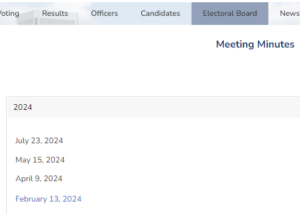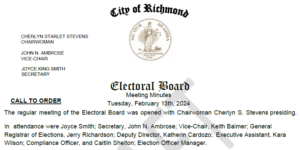Yesterday WRIC 8News published “Candidate’s dispute with Richmond’s elections office exposes error in city’s training video“, an article describing misstatements of law made by Keith Balmer, the city’s General Registrar. Balmer and his office incorrectly conflated forms required for a political action committee with those required for a candidate campaign committee. Stephanie Starling, a candidate for Richmond City Council whose position on the ballot was impacted by the misstatements, said that the “misinformation has caused confusion and raised questions about the integrity of the process.”
This is just the latest issue to arise from the Richmond Office of Elections after scandals involving violations of spending rules and nepotism and ethics policies.
In light of these problems, I decided to review the Electoral Board’s records to see if it’s complying with the transparency requirements of the Virginia Freedom of Information Act and Virginia’s election laws. I found several violations.
First, the Richmond Electoral Board violated the transparency requirements of Virginia’s election law. A public body is generally required to publish minutes of meetings to its website “within seven working days of final approval of the minutes.” Virginia Code §2.2–3707.2. Electoral boards, however, are subject to a more strict requirement: “Minutes of meetings shall be posted as soon as possible but no later than one week prior to the following meeting of the electoral board.” Virginia Code §24.2–107 (Emphasis added.)
The Richmond Electoral Board has violated this requirement by failing to publish minutes of two recent meetings. The Board publishes minutes to its website, but minutes for the meetings held on April 9, 2024 and May 15, 2024 have not been published. Virginia’s election laws required the minutes for the April 9 meeting to be published no later than May 8. Minutes for the May 15 meeting were required to be published no later than July 16. Attorney General Mark Herring, in his official Opinion 16-046, has explained that the requirement applies regardless of whether the minutes have been approved. By neglecting to publish the minutes when required, the Richmond Electoral Board violated Virginia’s election law.
The Board also violated the requirements of the Virginia Freedom of Information Act with respect to its closed meetings. The policy of the Commonwealth of Virginia is that “[t]he affairs of government are not intended to be conducted in an atmosphere of secrecy” (Virginia Code §2.2–3700) and it’s for that reason that VFOIA guarantees “free entry to meetings of public bodies wherein the business of the people is being conducted.” (Id.) Meetings can be closed to the public, but only for a limited number of reasons, and specific procedures are prescribed by law to ensure that those limits are respected.
When closing a meeting, the public body must “an affirmative recorded vote in an open meeting approving a motion that (i) identifies the subject matter, (ii) states the purpose of the meeting […] and (iii) cites the applicable exemption from open meeting requirements […]. The matters contained in such motion shall be set forth in detail in the minutes of the open meeting.” Virginia Code §2.2-3712(A) (Emphasis added.) The Virginia Freedom of Information Advisory Council has repeatedly held that all three elements are required. (See generally Advisory Opinion 02-16.) For its closed session held on February 13, 2024, the Richmond Electoral Board failed to cite the applicable exemption in the meeting minutes. Although it stated the purposed the meeting, it didn’t clearly identify the subject matter.
The Board neglected to certify the closed meeting as required by law. “At the conclusion of any closed meeting, the public body holding such meeting shall immediately reconvene in an open meeting and shall take a roll call or other recorded vote to be included in the minutes of that body, certifying that to the best of each member’s knowledge (i) only public business matters lawfully exempted from open meeting requirements under this chapter and (ii) only such public business matters as were identified in the motion by which the closed meeting was convened were heard, discussed or considered in the meeting by the public body.” Virginia Code §2.2-3712(D) (Emphasis added.) No such certification or vote is recorded in the minutes of the February 13 meeting.
In a statement published after the first scandals came to light, Balmer said that he is committed to “ensuring that our office operates with the highest standards of fairness, transparency, and integrity.” It’s hard to take that commitment seriously when the Board isn’t even satisfying the minimum legal requirements for transparency.


Leave a Reply